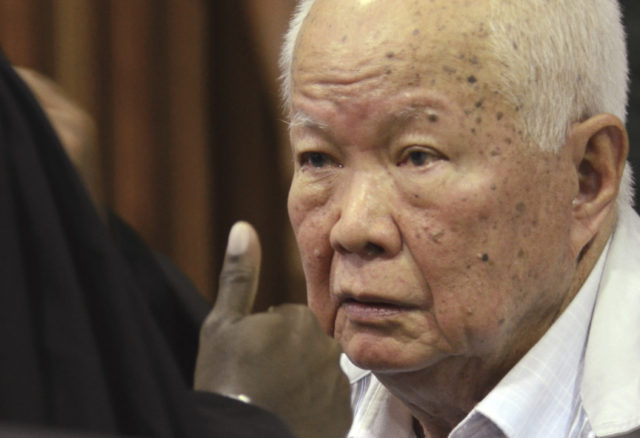PHNOM PENH, Cambodia (AP) — The last surviving leaders of the communist Khmer Rouge regime that brutally ruled Cambodia in the 1970s were convicted of genocide, crimes against humanity and war crimes Friday by an international tribunal.
Nuon Chea and Khieu Samphan were sentenced to life in prison, the same punishment they are already serving after earlier convictions at a previous trial for crimes against humanity connected with forced transfers and mass disappearances. Cambodia has no death penalty.
Both men have suggested they were targets of political persecution. Nuon Chea was considered the main ideologist of the Khmer Rouge and the right-hand man of the group’s late leader, Pol Pot, while Khieu Samphan served as the head of state, presenting a moderate veneer as the public face for the highly secretive group.
The verdict read aloud in the courtroom by Judge Nil Nonn established that the Khmer Rouge committed genocide against the Vietnamese and Cham minorities. Scholars had debated whether suppression of the Chams, a Muslim ethnic minority whose members had put up a small but futile resistance against the Khmer Rouge, amounted to genocide.
Members of the Cham community were among the large crowd of spectators who attended Friday’s session.
The court found Khieu Samphan not guilty of genocide against the Cham, for insuffient evidence, though he was convicted of genocide against the Vietnamese under the principle of joint criminal enterprise, which holds individuals responsible for actions attributed to a group to which they belong.
The Khmer Rouge sought to achieve an agrarian utopia by emptying the cities to establish vast rural communes. Instead their radical policies led to what has been termed “auto-genocide” through starvation, overwork and execution.
The crimes against humanity convictions covered activities at work camps and cooperatives established by the Khmer Rouge. These offenses comprised murder, extermination, deportation, enslavement, imprisonment, torture, persecution on political, religious and racial grounds, attacks on human dignity, enforced disappearances, forced transfers, forced marriages and rape.
The breaches of the Geneva Convention governing war crimes included willful killing, torture or inhumane treatment.
One of the spectators at Friday’s hearing was 65-year-old Sum Rithy, who said he had been jailed for nearly two years under the Khmer Rouge, who accused him of being a spy for the CIA. His life was spared only because he was a skilled mechanic who could maintain engines and generators for his captors.
Rithy said three of his siblings were killed by the Khmer Rouge, also accused of being CIA spies, while his father died of starvation.
“Today, I am very happy that the both Khmer Rouge leaders were sentenced to life in prison. The verdict was fair enough for me and other Cambodian victims,” he said. “Last night, I could not sleep because I was afraid that Nuon Chea and Khieu Samphan could die before this verdict was announced.”
Nuon Chea, 92, was brought by ambulance and Khieu Samphan by van to the courthouse from the nearby prison where they are held. The prison and the courthouse were custom built for the use of the tribunal, which is officially called the Extraordinary Chambers in the Courts of Cambodia, or ECCC.
Nuon Chea, who suffers heart problems, was allowed to move from the hearing room to a separate holding room. Khieu Samphan, 87, was present for the entire hearing and with the help of two security guards stood as his sentence was read, showing no obvious emotion.
Lawyers for Nuon Chea said they would appeal, and Khieu Samphan was expected to do the same.
In addition to the two, the tribunal in 2010 convicted Kaing Guek Eav, known as Duch, who as head of the Khmer Rouge prison system ran the infamous Tuol Sleng torture center in Phnom Penh.
There are fears that politics will thwart the tribunal from undertaking any further prosecutions.
Cambodia’s long-serving, autocratic Prime Minister Hun Sen has declared he will allow no further case to go forward, claiming they would cause instability. Hun Sen was a Khmer Rouge commander who defected when the group was in power and was installed in government after the Khmer Rouge were ousted by a Vietnamese invasion.
Initial work had been done on two more cases involving four middle-ranking members of the Khmer Rouge, but they have been scuttled or bottled up by the tribunal, which is a hybrid court in which Cambodian prosecutors and judges are paired with international counterparts.
The failure to have more extensive proceeding has discomfited some observers, but others point to the tribunal’s accomplishments.
“International tribunals are better than the alternative, impunity. They will always be political and fall short of expectations,” Alexander Hinton, an anthropology professor at Rutgers University and author of two books about the tribunal, said ahead of Friday’s verdicts. “But justice is usually delivered, even if at times, as has been the case with the ECCC, it staggers across the finish line.”

COMMENTS
Please let us know if you're having issues with commenting.